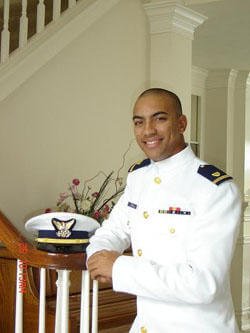Coast Guard officer Bernard Beale transitioned to retail upon leaving the military, and is now a store manager for Walmart. In the following interview we get his insights about his experiences, as well as tips for others who are interested in getting into retail.
1. Tell us about yourself. What’s your background?
I grew up in Houston and joined the U.S. Coast Guard in 2002 through the College Student Pre-Commissioning Incentive (CSPI) program. I graduated from Coast Guard Boot Camp that same year. In 2004, I graduated from Embry Riddle Aeronautical University with a bachelor’s degree in aeronautical science and a minor in aviation safety and meteorology. That year, I also graduated from Officer Candidate School as a Coast Guard commissioned officer in New London, Conn.
Over the years with the Coast Guard, I was stationed in Phoenix, Connecticut, Pensacola, Fla. and finished my career as an Enforcement Division officer at Sector Key West, Fla. In this position, my duties included coordinating law enforcement training for over 400 members, leading the command center responsible for a 55,000 sq nautical mile area, coordinating with multiple federal, state, and local law enforcement. Our missions responded to search and rescue cases, Alien Migrant Interdiction Operations (AMIO), Homeland Security cruise ship escorts, Illegal fishery operations and anti-narcotics operations.
Once I decided to separate, despite the challenging economy in 2008, I had two very good job offers: one from the Motion Picture Association of America to head up their North American anti-piracy operations, and the second was to be a developmental co-manager at Walmart. The decision was very difficult but in the end, Walmart seemed to have a lot more growth potential so I decided to sign up. I am now a store manager for Walmart in Stevenson Ranch, CA.

2. Why did you decide to leave service?
When I tell people my background before Walmart they always ask “how did you end up in retail?” I decided to leave the Coast Guard after six years of service because, after being stationed in four places during that short time, I wanted to settle into one geographic location. I also got married to my beautiful wife and wanted to establish a better work-life balance. My wife wanted to pursue her acting career full time in Los Angeles and I realized all the experience on my resume from both my education and the Coast Guard could be very competitive in the civilian market. So we moved to Los Angeles where I figured my wife could pursue acting and I would be able to get a job quickly.
3. How did you make the transition? Was it difficult?
I definitely had some nail biting moments because I thought, with my resume and experience, I would be able to get a job fairly quickly. When we moved to L.A., I planned to use the three months of leave that I had saved for my transition to land a job. I figured I would get a job within a month at most, but the day I got my first check from Walmart was the day I got my last check from the Coast Guard. It took me exactly three months to find a job which, in 2008, was actually a miracle. When I look back at it, our country was in the middle of an economic downturn and for job seekers, the future appeared very bleak.
Once I got hired in August 2008 things happened much faster than I could’ve ever imagined. My first assignment was as a Developmental Co-Manager at store 3523 in Santa Clarita, CA. After only being there for nine months I received an email to take an assessment for a brand new pilot program called Store Manager Leadership Academy (SMLA). I locked myself in an office and took the assessment.
Some weeks passed and right around the time I had an opportunity to advance out of my developmental role into a full co-manager position, I got an email saying, “Congratulations you’ve been selected to attend Store Manager Leadership Academy!” I was immediately excited, but quickly realized that I still didn’t know exactly what I was in for. By attending the course, I would have the opportunity to promote to store manager much faster than I would have on my current path. I quickly jumped at the opportunity and began my training. In November 2009, I officially took over the Panorama City Walmart. After one year I was asked to run another store in Stevenson Ranch, CA where am today.
4. What resources did you use in your job search?
I used all the major online job search sites: TheLadders.com, USAjobs.com, LinkedIn.com – every one of them. I managed to line up some interviews from these resources, but none of the salaries were comparable to the salary I was making with the Coast Guard. The challenges that job hunters have today are so much more complicated than just 10 years ago. The internet has transformed the process into a virtual "cattle call," whereas before you were, for the most part, competing with local applicants, now you are competing with everyone that has access to the internet across the world, so you have to find a way to separate yourself.
My competitive job offers came two ways; the Motion Picture Association of America job developed from networking with people and sending out my resume a couple of months before I was leaving the service. The other job offer from Walmart developed from using the military-to-civilian headhunter organization, Orion International. They proved to yield the best results in setting up six high quality interviews, and one of them happened to be Walmart.
5. What do I need to emphasize about my current service to those on the outside?
When you are looking to transition, it is important that you quantify your military job function and translate that into a tangible job skill in the corporate world. If you can effectively do this, an employer can easily see you as a valuable asset to his or her business. For an example, in my case with the USCG, I was responsible for the law enforcement training and qualification of over 300 service members. My job as a Walmart store manager requires me to lead and train 300-500 associates in various aspects of retail. Although those two jobs are very different I still had experience with the military that was directly transferable to retail. I was then able to make this connection on both my resume and later in my interview that helped make me a strong candidate, even though I had no retail experience. It also helped that Walmart is very military friendly.
6. If you had to tell someone one thing about transitioning, what would your advice be?
Speaking as a military veteran, I know how important it is to never to go into a situation without a plan. A transition out of military service is a difficult decision to make, so mapping out your plan carefully is crucial. Make sure you are savvy with the current job market you are entering so you can adjust your transition strategy accordingly. Don't let anyone discourage you by telling you that you are making the wrong decision. The military gives us vital tools that are valuable in any job market; use those tools to your advantage.
###
Quick Facts- Walmart and the Veteran and Military Communities:
-
- Walmart recently launched a new veteran-focused career site- www.walmartcareerswithamission.com aimed at matching veteran and transitioning military’s jobs skill with Walmart’s career opportunities.
- Walmart is a national sponsor of the U.S. Chamber of Commerce’s “Hiring Our Heroes” career fairs. The Chamber is hosting more than 100 fairs for veterans and military families in cities across the United States. For a full list of upcoming career fairs, please visit: www.uschamber.com/veterans.
- On Veterans Day 2010, Walmart and the Walmart Foundation launched a five-year, $10 million commitment to organizations that serve the veteran and military communities, placing a special emphasis on supporting job readiness and training. This past August, during the annual meeting of the American Legion in Minneapolis, Minn, Walmart announced that they’d double their support from $10 million to $20 million through 2015.
- Walmart’s Military Family Promise guarantees a job at a nearby store or club for all military personnel, and military spouses, employed at Walmart and Sam’s Club who move to a different part of the country because they or their spouse have been transferred by the United States military. The program also ensures associates called away to active military duty will be paid any difference in their salary if the associate is earning less money during their military assignment.











